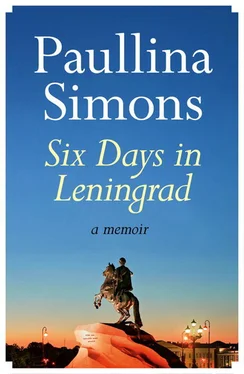I was too scared to call her right away, so I called my grandparents in New York instead and then called my mother at the hospital. She was groggy and recovering, but even I could tell, she was not happy not to have heard from us.
That took the whole morning. In the afternoon I made Russian beef soup and blinchiki that opened up like tacos. It took me three and a half hours to make dinner. My house was quite beautiful. I tried not to look at it. Granite island, white cabinets, brass hardware, handscraped floors, crown mouldings, tall ceilings. Lots of large rooms with solid-core doors. Two staircases. Three-car garage. My head deeply bent, I tried not to look at any of it.
Kevin came home, and we ate my taco blinchiki, and went swimming, and put the kids to bed, and watched some TV.
The next day we got up and did it all again. And the next day. Life continued as if I hadn’t been to Russia, hadn’t been to Shepelevo, hadn’t been to Leningrad.
Except… I couldn’t lift my head, my eyes, my heart to my house.
I said I would tell Kevin about Russia after I got my photographs developed, but when I had the photos developed, I didn’t want to tell him yet without putting the photos in order, and after I put the photos in order, I didn’t want to tell him yet without putting them in context.
This book is that context.
It took me eight months to write it. I wrote it when I should’ve been writing The Bronze Horseman , the book three editors in three different countries were desperately waiting for, the book that was egregiously late.
In the photos, Leningrad doesn’t look quite so drab. The kind lens softens the peeled paint, flattens the broken stucco. Rust looks like a ray of light, dirt becomes the street. The Nevá is gorgeous, and so is the sky, and there is no smell of communism.
No smell of subway or Shepelevo or crème brûlée, or wet trees, no azure sky, no white Gulf of Finland as if it was covered by snow.
I had a hard time talking about it to Kevin. I had trouble reducing Russia to a pithy phrase over the non-stop chattering of my children on the way to Baskin-Robbins. What sound bite can I give over the dinner table? What will be my quote of the day about Russia?
My six days didn’t fit well into our life, and I knew it when I was flying home. I knew there would be no time in our daily ritual to stop and talk about Russia, and I was right. The not talking about it became both a solace and a disgrace.
Let’s just get through the day, our lives said, and then put the kids to bed. Talking involved a break from ritual because it involved animate objects — thoughts, words, emotions, reactions colliding against one another and morphing into a different reality than our Texas reality, which seemed less and less real by the hour. Who needed that?
We would clean up, maybe unpack some books, go to bed, read for a few minutes, kiss and fall asleep, and in the morning we would once stumble out of bed. Kevin went to work, and I was left home with my life and my insides.
He would come home for dinner. Sometimes there would be swimming and sometimes we would just putter, all tense from the day and stressed. Never a moment to break free of life and think about another life, another time when I lived and felt things I had never felt in my life, when I didn’t chase wet dogs who were running around my brand new carpet.
I came home one afternoon to find a message on my answering machine. A female Russian voice was saying, “Misha, is this you? Pick up the phone, Misha, I want to talk to your mommy.” All of this was in Russian, like Misha could speak a word of it.
I went up to my office and the phone rang. A woman’s voice in Russian said, “Plinka? Plinka is this you?”
I didn’t know quite what to say. Was it me?
I said yes.
“Plinka, do you know who this is? It’s Yulia! Yulia. Oh, Paullina, how could you have? How could you have come to Russia and not called me, and not seen me? How could you have done it?”
Thank God I was sitting down. Yulia cried and cried.
“I’m sorry, Yulia.” I said. “I’m really sorry. We had no time. We only had six days. Six lousy days, Yulia, I’m sorry.”
But she didn’t understand. She talked and talked, railing at the injustice, at my callousness. Her voice, high-strung and emotional carried with it such regret, such sorrow. “I would have come to the airport to see you off,” she said. “I found out only on Friday and I called Anatoly the whole day Saturday but no one picked up. You were leaving Sunday, and I would’ve come to the airport to see you; I was so desperate to see you, I must have called Anatoly seven hundred times, that’s all I did Friday and Saturday, I dialed his number over and over, but no one picked up. But I couldn’t come to the airport, do you know why? Because I was going into labor! Labor, Plinka. I had another child, can you believe it? The day after you left, I had my little girl. So now I have two children, can you believe it, two, a boy, and a girl. I named the girl Maria. For our Babushka. She liked it. I just talked to her. She was very happy.”
I was mute.
“How could you not have come to see me, Plinka?” she repeated mournfully.
“Yulia, I didn’t even know where you lived.”
“I live in the same place, Plinka! Where else am I going to live? The same apartment I shared with my Mama. I still live there on Prospekt of Veterans! But who cares where I live, I would have come anywhere to see you, anywhere, you tell me where and I would have come, you have no idea how I think of you every day of my life, how I think of you, I’ve never had anyone who was a sister to me. You were my only sister. I love you so much, how could you have not come and seen me?”
She cried again.
We are swinging in the hammock in the afternoon. We are with our bare legs in the stream our hands trying to catch the little fish that swim by, we are staring in wonder at Dedushka’s bleeding foot, Yulia running to our grandmother yelling, ‘Babushka, Babushka, Plinka split her leg open, Babushka come!”
Here we are, here we are .
“How are you, Yulia?” I said, my voice catching. “How have you been?” I closed my eyes so I wouldn’t see my swimming pool and the prairie out of my window. What was she seeing when she talked to me? Did she see the Prospekt of Veterans outside her window? Did she see the Khrushchev buildings blighted by her tears as she cried to me on the phone.
“I know nothing about your life,” Yulia said. “What are you doing now? I don’t even know how many children you have. How many do you have?”
“Three,” I said. “We’ll come to Russia again, Yulia. We will come again, all of us, my husband too.”
“Well, next time you come don’t you even think of staying in a hotel. You stay with me. I have room. I have room. All of you stay with me. You don’t have to worry about anything, about food or anything. You just come, and I’ll feed you and take care of you. I’ll do everything. Just come and see me next time, Plinka.”
“Okay, Yulia.” I wiped my face.
“Oh, dear one,” she said. “If only you knew how much I love you.”
We talked for a half hour. She told me the new baby was from her current husband, who wasn’t living with her. Then she told me he wasn’t her husband either.
“But I really like the baby,” she said. “Haven’t had one in nearly eleven years.”
I promised to write and send pictures of my family.
I couldn’t look at my house the same way anymore, or my pool or my hardwood floor, or my dogs, or the view. I didn’t feel the same about my house anymore. I didn’t feel the same about my life.
Читать дальше












